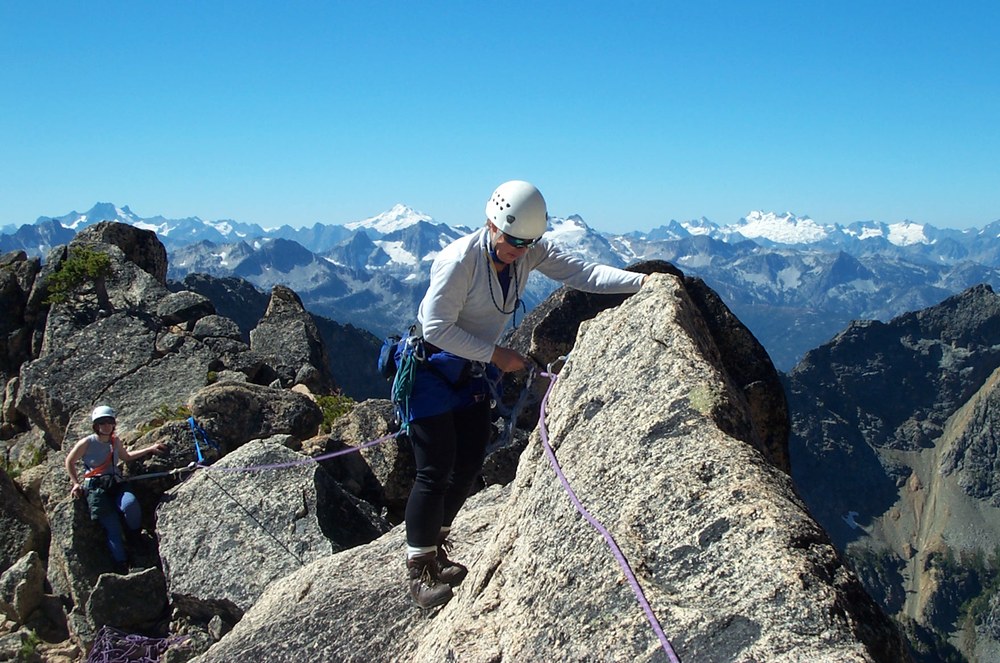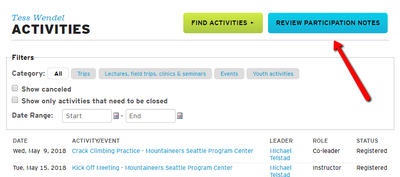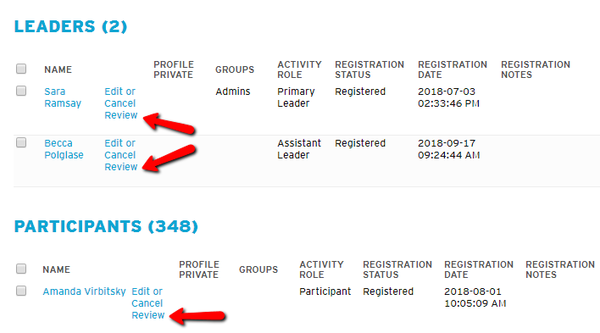
Participation Notes are an important part of The Mountaineers internal reporting and tracking processes. Leaders use this tool to capture and review notes about a member's past participation that might be useful for future leaders.
Updated June 2023
What are Participation Notes?
Participation Notes are a way for leaders to capture notes about a member's past participation that may be useful to other leaders. These notes are linked to activities and are visible to committee admins, leaders, and staff. They are typically used to make note of things like a participant's level of mastery over a certain skill, and they can also be a great way to identify people with demonstrated leadership potential.
Leaders have the opportunity to add Participation Notes after any activity. The Mountaineers encourages leaders to add a Participation Note if objective feedback would benefit the community or help another leader better support that participant on a future trip.
Can members view their own participation notes?
Members who do not have committee admin or leader privileges cannot see their own Participation Notes, but members who do have committee admin or leader privileges can. Committee leaders and admins have permission to see other members Participation Notes, and the website does not exclude this function from their own profile. Our hope is that the people empowered to give feedback via Participation Notes will be open to receiving feedback from others.
How should leaders approach Participation notes?
When writing Participation Notes, it is best practice to write your feedback in a way that you'd be comfortable with the participant reading it. Be objective, clear, and compassionate. Participation Notes should also never come as a surprise to the participant. In addition to documenting your thoughts or feedback via Participation Notes, be sure that you're providing direct feedback to the participant about what you observed - be it positive or constructive.
Examples: If a member on your roster has had difficulty self-arresting on moderate snow slopes, or wet-exiting from their kayak, you need to know that. It's a safety concern! If a member on your roster consistently steps-up and brings a great attitude to every trip they attend, you want to know that, too. They’re an asset, and perhaps you can encourage them to become a leader sometime in the future.
Participation Notes are a tool to help our leaders to better vet the members on their roster. Use them as a conversation starter to see where folks are at, and to assess whether or not a member is well-suited for your trip!
Important! Participation notes are a snapshot of a person's participation at a moment in time - whether that's positive, constructive, or neutral. They provide a data point for consideration on future trips. The Mountaineers expects that leaders do not categorically remove or deny someone from their roster after reading a Participation Note, without first discussing any concerns with the individual to learn more about their current skill or experience.
As a person gets more experience, past Participation Notes are often "updated" by a newer note that captures a change in skill or experience. They are a great tool for tracking trends over time.
How do I view someone’s Participation Notes?
To view a member’s Participation Notes, click on the “Activities” tab on their profile, then click on the blue “Review Participation Notes” button at the top of the screen.

You may also click "Review" on your roster to view a member's full activity history, including any Participation Notes.

If I’ve already completed an Incident Report and/or a Behavior Complaint Form, Should I still add Participation Notes?
Yes! Information from either of those forms will not auto-populate into the member’s Participation Notes from your activity. If you do not add any relevant Participation Notes, that information will not be available to the next leader.
Are Participation Notes only meant to document problems or concerns?
No! Participation Notes are a great tool for identifying aspiring leaders or members with strong skillsets.
When can I add Participation Notes to a member’s profile?
For a refresher on how to close an activity and add Participation Notes, you can read more here.
Building our Community Together
The Mountaineers is a community of individuals, and it is our responsibility to look out for one another. As you go to close your next activity, think critically about your group. Did you wish you’d known more in advance about any of the group members’ hard skills or soft skills? Did you need to file an Incident Report? Did you notice any exceptional, aspiring leaders? If the answer to any of those questions is “yes”, chances are that you should take a few minutes to add some Participant Notes. This system only works if our leaders take the time to “pay into” it together, so we appreciate your additional effort.
Add a comment
Log in to add comments.It's also VERY important for leaders reading a participant note to contact the leader who wrote that note to understand the situation before deciding to act on that info. We don't want one bad day to follow a participant around for years afterwards! Always be thoughtful of the person's feelings and seek to understand what happened, don't just reject a person for your trip based on a past bad note.
Hoping that notes are clearly dated and that participants are able to both view and respond to provide, for example, a more recent picture of, say, fitness, skill level or approach.
For clarity: participants cannot yet view participation notes about themselves (unless they also happen to be a "leader" or "committee admin").
 The Mountaineers
The Mountaineers